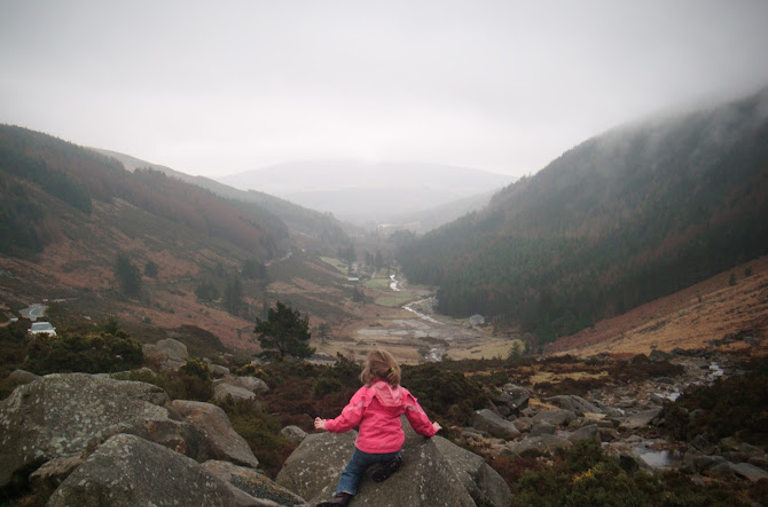We devote much of our lives to our children, the messages we send to the future we will never see.
If you walk through a city today, almost everything you see around you was conceived, designed, forged, shaped, fit and lain almost exclusively by married men trying to feed their wives and children, or by single men trying to earn enough money to attract women for sex and children. Without children, there’s no point in working hard, or defending one’s country, or avoiding addiction, or living.
People who do succeed in having children, though, shape everything in their lives around them. They pay mortgages, not because adults need a house, but so the children can have a yard to play in. They pay high prices for certain neighbourhoods, not because they need it themselves, but because they want to send their children to good schools. They plan holidays around their kids’ schedule. They keep healthy, resisting the temptations of the world, so that they remain with their children as long as possible.
We spend every evening reading to our children, taking walks with them, bringing them along as we check on the elderly neighbours or pick up roadside trash. We take them with us through our lives, but more than that, we change our lives for them. We aspire to become what our three-year-old sees when they look at us, and their gaze makes us better people.
For most of history, people also taught their children what they needed to know to live – hunting, farming, the family trade – expecting life in their children’s age to be much as theirs had been. For recent generations across much of the world, though, this has changed completely – as the fossil fuel boom transformed the landscape, parents assumed life in the future would be very, very different, and for a while they have been right. Old professions – farmer, cobbler, mason, miller, wright – became mere surnames and vanished from census records. The skills themselves disappeared almost completely, as parents did not pass on what they thought would be obsolete.
Our children might face a world moving in the opposite direction. We have a world powered by fossil fuels that will not last forever, dependent on a stable climate that is swiftly growing chaotic, financially dependent on global trade and debt that is becoming unsustainable, and accustomed to peace and cheap goods whose days are numbered. Technology may continue to develop, but there might be less industry to build it, less energy to run it and less money to pay for it.
Most people I talk to — farmers, construction workers, taxi drivers — understand that there is an ecological and economic crisis, even if they don’t understand all the details. Most people also have children. Yet web sites and publications that discuss the environment or the economy rarely talk about children, and how to train them to deal with the world we anticipate, and most environmental activists I know have a strange absence of children.
It doesn’t help that we’re not sure what to prepare them for. Should we teach them how to write resumes and operate software to thrive in the businesses that exist today, or will they no longer exist a few decades from now? Should we teach them bushcraft skills to survive in the wild, or will those be useless standing in the unemployment line? We could teach them the old skills of farming and village crafts, but we don’t know for certain what crafts will make a comeback – and they would have to practice them while still making a living in the present-day world of suburbs and office complexes, which does not have a ready market for farriers and cobblers.
The best solution is probably to teach them the broad basics, and let them develop more specialized skills as interest and opportunities allow. We can’t second-guess the world, but we can give them the fundamental knowledge and attitude to react to a wide spectrum of unforeseen events. If you home-school, you can turn these into full courses – but even if you send them to a conventional school, you can continue to teach, talk and explore while making supper, driving or reading bedtime stories.
Take, for example, cooking. Amazingly, more than half of all Americans don’t cook anything that didn’t come out of a package, and I don’t imagine Ireland is vastly different. Show them how to put meals together with the basic trinity of vegetables, starch and protein. Show them how to sautee onions, blanch beans, sear meat and make salad dressing. They don’t have to become a master chef – they just have to cook healthy things they like.
Introduce them to growing things. Let them put beans on wet paper towels and watch them grow into sprouts. Have them plant seeds in a cup, and watch them check it day after day as it becomes cress. Take them into the garden as you check the plants for disease, prune the trees, weed the soil. Enlist their help; as Irish farmer John Seymour put it, there are few greater threats to caterpillars than a well-motivated three-year-old.
Teach them to forage, to pick flowers and shoots from fields in spring and fruits and nuts from trees in the fall. Most kids are fascinated by animals, and even unbidden would hunt for crayfish or snails like Easter eggs.
Show them how to turn one food into another – milk becomes yogurt, fruit can be dried for snacks, vegetables can be pickled. To a child, there are few things more fun than pounding and playing with bread dough. To an adult, there are few things more entertaining than their look of astonishment when you uncover the hidden dough and it’s twice as large as before.
Remember that children find their own routine normal, no matter how we feel about it, and they learn things not because we think they are important, but because we repeat them over and over. Make the lessons into song lyrics, set to some catchy tune they like. Make lessons into a game or a contest.
Read to them. I’m astonished at the number of parents who give their children phones or tablets, or let them play video games, often without even checking what they watch. Children don’t need to learn computer games or the latest programmes, but they do need to read, and see you reading. Nor do they need to read books just for children, many of which were created just as consumer products and not as literature. A few centuries ago children grew up reading complex adult material at very young ages, and yours can too.
When they are old enough, show them how money works. Most of our forebears kept their private parts private, but parents taught their children how to manage money wisely; today, almost nothing is embarrassing or forbidden except money. Most people I know were never taught how to do their taxes, estimate an appropriate salary or choose the right products when shopping, but if you teach your child these things, they will have an edge over most of their peers.
Demonstrate that take-out food can be made more quickly at home, for a fraction of the price. Introduce them to compound interest – lend them money at five percent interest per day, and show them how their debt doubles in a fortnight. Later, when they are old enough to have credit cards and mortgages – if such things exist — they might remember.
Introduce them cheerfully to the notion that accidents happen, things break and the centre does not hold. It probably won’t happen, and there’s no point worrying, but we’d best know what to do just in case. My four-year-old helped me pack an emergency bag, and we recited like a nursery rhyme the items we needed: If it rains we have ponchos, masks if there’s smoke. This filters the water if pipes ever broke.
The older they get, the more they should learn how the world is connected. This new gadget all your friends have – where was it made? What is that country like? How much energy does it take to ship it here? How long does it last? You might not want to introduce them to too much global tragedy too early, of course, but older children might like the opportunity to solve a mystery, and would take more seriously a conclusion they’ve reached on their own. I used to be an investigative reporter, and think everyone should be one, just for a little while – it should be a year-long course for teenagers.
Let them be curious. If they ask you questions whose answer you don’t know, be careful not to dismiss them or make something up – no parent thinks they would ever do that, but we all get busy and distracted. Admit you don’t know and look it up, or teach them to do so. Don’t let them accept Wikipedia or Google’s first entry. Demonstrate that there’s nothing wrong with not knowing the answer, and there’s something very right about asking the question.
Bring them along. Let them see you shovel an elderly neighbour’s walkway of snow, help build a community garden at the local church, buy second-hand clothes, split a bulk-food order with co-op members, speak at City Council meetings. Know that these things, too, are part of being a good neighbour and good citizen, something that decent people do.
Finally, I try to remember that daughter is not a blog I fill with my own thoughts – she has her own interests and will, and her future is as uncertain as the world’s. You can influence them as you influence your spouse, but you’re not going to make them into someone they’re not. Luckily, there are uses for every type of personality, and we will need everyone in the years ahead. Try to make your kids understand that too – we are entering a time when we’ll need each other, and we’re all in this together.
Photo by Brian Kaller. Used by permission.






